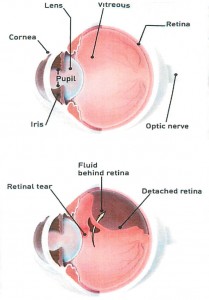By Lauren R. Rosecan, M.D., Ph.D., F.A.C.S. –
 WHAT IS THE RETINA?
WHAT IS THE RETINA?
The retina is a nerve layer at the back of your eye that senses light and sends images to your grain.
An eye is like a camera. The lens in the front of the eye focuses light onto the retina. You can think of the retina as the film that lines the back of a camera.
WHAT IS A RETINAL DETACHMENT?
A retinal detachment occurs when the retina is pulled away from its normal position. The retina does not work when it is detached. Vision is blurred, just as a photographic image would be blurry if the film were loose inside the camera.
A retinal detachment is a very serious problem that almost always causes blindness unless it is treated.
WHAT CAUSES RETINAL DETACHMENT?
A clear gel called vitreous (vit-ree-us) fills the middle of the eye. As we get older, the vitreous may pull away from its attachment to the retina at the back of the eye.
Usually the vitreous separates from the retina without causing problems. But sometimes the vitreous pulls hard enough to tear the retina in one or more places. Fluid may pass through the Retinal tear, lifting the retina off the back of the eye, much as wallpaper can peel off a wall. The following conditions increase the chance of having a retinal detachment:
- Nearsightedness
- Previous cataract surgery;
- Glaucoma;
- Severe Injury;
- Previous retinal detachment in your other eye;
- Family history of retinal detachment;
- Weak areas in your retina that can be seen by your ophthalmologist (Eye M.D.)
WHAT ARE THE WARNING SYMPTOMS OF RETINAL DETACHMENT?
- Flashing lights;
- New floaters;
- A shadow in the periphery (side) of your field of vision;
- A gray curtain moving across your field of vision.
These symptoms do not always mean a retinal detachment is present; however, you should see your ophthalmologist as soon as possible.
Your ophthalmologist can diagnose retinal detachment during an eye examination and will dilate (enlarge) the pupils of your eyes. Some retinal detachments are found during a routine eye examination.
Only after careful examination can your ophthalmologist tell whether a retinal tear or early retinal detachment is present.
WHAT TREATMENT IS NEEDED?
RETINAL TEARS
Most retinal tears need to be treated with laser surgery, which seals the retina to the back wall of the eye.
This treatment causes little or no discomfort and may be performed in your ophthalmologist’s office. Treatment usually prevents retinal detachment.
RETINAL DETACHMENTS
Almost all patients with retinal detachments require surgery to return the retina to its proper position.
TYPE OF SURGERY:
VITRECTOMY
This surgery is commonly used to fix a retinal detachment and is performed in an operating room. The vitreous gel, which is pulling on the retina is removed from the eye and usually replaced with a gas bubble. Sometimes an oil bubble is used (instead of a gas bubble) to keep the retina in place.
Your body’s own fluids will gradually replace a gas bubble. An oil bubble will need to be removed from the eye at a later date with another surgical procedure.
Sometime vitrectomy is combined with a scieral buckle.
AFTER SURGERY
You can expect some discomfort after surgery. Your ophthalmologist will prescribe any necessary medications for you and advise you when to resume normal activity. You will need to wear an eye patch for a short time.
Flashing lights and floaters may continue for a while after surgery.
If a gas bubble was placed in your eye your ophthalmologist may recommend that you keep your head in special positions for a time.
DO NOT FLY IN AN AIRPLANE OR TRAVEL AT HIGH ALTITUDES UNTIL YOU ARE TOLD THE GAS BUBBLE IS GONE! A rapid increase in altitude can cause a dangerous rise in eye pressure.
With an oil bubble, it is safe to fly on an airplane.
A change of eyeglasses is often helpful after several months.
Lauren R. Rosecan
M.D., Ph.D., F.A.C.S.
The Retina Institute of Florida with four offices conveniently located in Palm Beach and Martin Counties.
Toll Free Phone Number: 1-800-445-8898 Or 561-832-4411
 South Florida Health and Wellness Magazine Health and Wellness Articles
South Florida Health and Wellness Magazine Health and Wellness Articles




